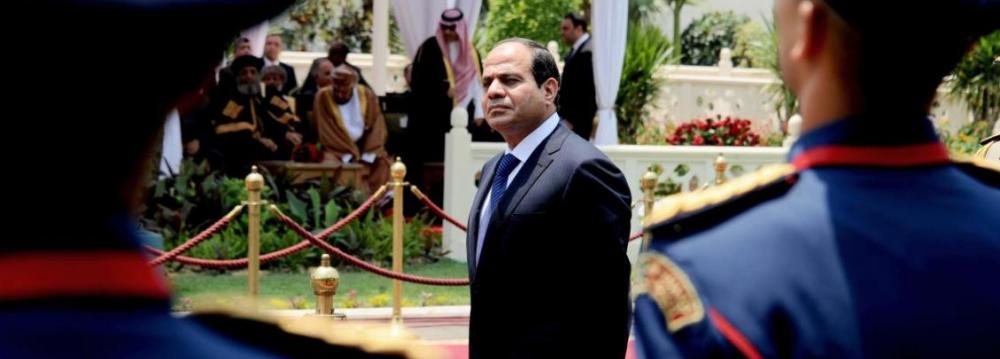Egyptian President Abdel Fattah el-Sisi privately “despises” Persian Gulf Arab rulers, despite their substantial financial aid to Egypt, and in contrast to his public statements of lavish praise towards the oil-rich states, a number of leaked audio recordings allege.
Following the emergence of recordings, Sisi phoned the leaders of Saudi Arabia, Kuwait and Bahrain as well as the Crown Prince of Abu Dhabi Sunday night, during which the Persian Gulf Arab leaders reassured Egypt’s president of their continued support to his country, AFP said in a report.
The leaks also allege that Sisi - when he was the head of the Egyptian army – had been too cosy with his Arab funders, especially the former Saudi king, providing them with sensitive information.
The recordings were aired on Saturday night by the Turkey-based Egyptian satellite TV channel Mekameleen, a supporter of former Islamist Egyptian president Mohammed Morsi, the country’s first freely-elected leader, who was overthrown by the army on 3 July, 2013.
The leaks, which couldn’t be verified, were reportedly recorded early 2014. The voices in the recordings were reportedly of Sisi, who was then defense minister; brigadier general Abbas Kamil, the manager of Sisi’s office; and Mahmoud Higazi, who was then head of intelligence and now head of the army.
In one recording, Sisi is alleged to have asked Kamil to request $10 billion from each of Saudi Arabia, the UAE and Kuwait, to be transferred to a bank account that belongs to the military institution, which he headed at the time, and not to the state.
Sisi and Kamil were reportedly recorded discussing ways money could be funneled into Egypt from the Persian Gulf without public knowledge. “They have money like rice,” Sisi is heard saying in the leak, suggesting that Egyptians should have a share of that money “like the Americans.”
Sisi and Co.
A second leaked recording was reportedly of a phone conversation between Kamil and a Saudi official, Fahad al-Askara, who is an aide to Khalid al-Tuwaijri, the secretary general of the Saudi royal court under the late King Abdullah, before he was ousted by King Salman this year.
In addition, Kamil reportedly told the Saudi official that the Egyptian military council will vote in favor of Sisi’s bid to run for the presidential office before the vote took place and before it was announced to the Egyptian public.
Most of the alleged insulting language was attributed to Kamil, who branded Arab countries – particularly Kuwait - as “half-states”, who should “pay up” because they “are living a fancy life and have piles of money.”
The alleged third conversation appears to be primarily focused on securing money from Arab donors – while using a tone of “despise” towards them, according to the channel – in stark contrast to Sisi’s public statements which claim that Egypt and Arab states have a “shared national security.”
Prior to airing the program, the channel had called on Saudi King Salman bin Abdulaziz and the people of Saudi Arabia, as well as Qatari Emir Tamim bin Hamad al-Thani and the people of Qatar to tune in to listen to the leaks.
Stadium Stampede
At least 22 people were killed outside an Egyptian football match on Sunday when security forces barred fans from entering the stadium, the public prosecutor’s office said.
Most of the dead were suffocated when the crowd stampeded after police used teargas to clear the fans trying to force their way into a league match between two Cairo clubs, Zamalek and Enppi, doctors and witnesses said.
Despite the violence, the match went ahead and ended with a 1-1 draw. The Egyptian authorities suspended football league matches indefinitely after the clashes.
Football matches are often a flashpoint for violence in Egypt where 72 fans were killed at a match in Port Said in February 2012. Since then Egypt has curbed the number of people allowed to attend, and supporter groups have often tried to storm stadiums they are banned from entering.
Relations between security forces and fan groups, known as Ultras, have been tense since the 2011 popular uprising that ended the rule of Hosni Mubarak, in which the Ultras played a key role.


